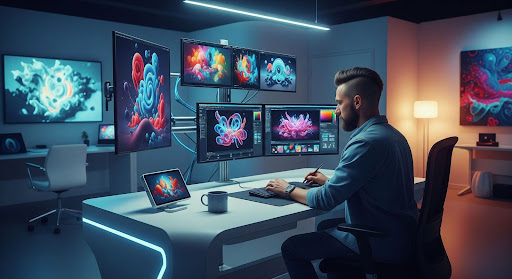Now Reading: Jobs That AI Can’t Replace: Why Human Touch Still Matters
-
01
Jobs That AI Can’t Replace: Why Human Touch Still Matters
Jobs That AI Can’t Replace: Why Human Touch Still Matters

Not too long ago, I sat down for coffee with a friend who works in HR. As we talked about the growing presence of AI in business, she mentioned how people in her field often fear that AI might one day replace their jobs. After all, automation and machine learning are everywhere. But, as I sipped my latte, I realized something—there are jobs that AI simply cannot replace, and many of them require a uniquely human touch. These roles are grounded in emotional intelligence, empathy, and complex decision-making—qualities that AI can’t replicate, no matter how advanced it gets.
In this blog post, I’m going to walk you through the jobs that AI can’t replace, from healthcare to human resources, and explore why these fields are still very much human-centric. But we’ll also talk about how AI can complement these jobs and enhance human capabilities, rather than replace them entirely. Ready? Let’s dig in!
Why Are Certain Jobs Safe from AI?
Before we dive into the specific roles, let’s discuss why certain jobs are particularly resistant to AI takeover. AI is fantastic at automating repetitive tasks, analyzing data, and even generating content. However, when it comes to tasks that require emotional intelligence, empathy, and complex human judgment, AI falls short.
Think of it this way: While AI can calculate equations, interpret data, and even recognize patterns, it can’t fully understand what it’s like to feel or experience life. This is where the magic of human interaction comes in. Roles that require nuanced understanding and empathy will always be in demand, and AI can only assist, not replace.
Let’s now explore some jobs that fall into this category.
What Jobs Require Emotional Intelligence That AI Can’t Replicate?
Therapists and Counselors: The Heart of Healing
Ever been to therapy and felt like the counselor really gets you? That’s emotional intelligence at work—something that AI will never be able to replicate. Therapists and counselors use active listening, empathy, and critical thinking to navigate deep emotional issues. They are able to form connections with their clients, which allows for healing and progress. An AI might be able to diagnose, but it can never provide the emotional support needed to help someone work through complex mental health challenges truly.
AI-driven tools might be useful for tracking progress or even providing cognitive behavioral therapy (CBT) exercises, but they can’t replace the warmth, understanding, and human connection that a real therapist brings to the table.
 Credit: Gemini
Credit: Gemini
Social Workers: Navigating Complex Lives
Social workers are essentially the superheroes of our communities, often stepping in during some of the most difficult times in people’s lives. From managing child welfare to helping people navigate the criminal justice system, social workers understand the human nuances behind every situation. They deal with emotional, social, and cultural complexities that AI simply cannot comprehend.
While AI can assist with case management or help predict trends based on data, it can’t replace the ability of a social worker to understand the emotional context of a situation and make the best decision for all parties involved.
Healthcare Professionals: Doctors, Nurses, and Caregivers
Ah, healthcare—where lives are at stake. AI can be a tremendous asset in diagnostics, data analysis, and even administrative tasks, but when it comes to providing care, the human touch is irreplaceable. Doctors and nurses don’t just treat the body—they treat the person as a whole. The ability to understand and respond to a patient’s emotional state, communicate compassionately, and make decisions that balance medical knowledge with personal judgment is something no machine can replicate.
Caregivers, in particular, offer a level of compassion and understanding that AI simply cannot provide. These roles are about building trust and comfort, qualities that go far beyond what any algorithm could ever understand.
 Credit: Gemini
Credit: Gemini
How About Roles Involving Human Interaction and Conflict Resolution?
Human Resources Professionals: The Heartbeat of the Workplace
The role of HR is not just about screening resumes or processing payroll. It’s about understanding the dynamics of human behavior, resolving conflicts, fostering a positive work culture, and maintaining a level of emotional intelligence that AI struggles to grasp. Whether it’s handling sensitive employee relations issues or guiding managers on best practices for engagement, HR professionals bring a deep understanding of people’s emotions and motivations to their roles.
AI may help automate administrative tasks, but it can’t replace the human side of HR—the delicate balance of understanding, conflict resolution, and the ability to make judgment calls that can affect the well-being of entire teams.
How to Make the Most of Jobs That AI Can’t Replace
Even though these roles are unlikely to be fully replaced by AI anytime soon, that doesn’t mean they can’t benefit from AI tools. Here’s how you can stay ahead of the curve and leverage AI to enhance your job rather than be replaced by it:
Embrace AI as a Tool, Not a Threat
AI isn’t here to steal your job—it’s here to empower you. In healthcare, for example, AI can assist doctors with diagnostic tools, giving them more time to focus on patient care. In HR, AI can help streamline hiring processes and make data-driven decisions, allowing professionals to spend more time engaging with employees on a personal level. The key is to see AI as a collaborative partner.
Develop Your Emotional Intelligence
Since AI can’t replicate empathy, emotional intelligence (EQ) will remain a crucial asset in many jobs. Whether you’re a counselor, social worker, or HR professional, strengthening your emotional intelligence will only make you more valuable. Practice active listening, understand non-verbal cues, and learn how to manage emotional responses—skills that will always be in demand.
 Credit: Gemini
Credit: Gemini
Focus on Creativity and Critical Thinking
AI can process information, but it struggles with creativity and critical thinking in complex, unpredictable situations. By focusing on developing these skills, you ensure that you’re adding value that AI simply can’t replicate. Whether you’re solving problems in healthcare or resolving workplace conflicts, these skills will keep you indispensable.
FAQ: Questions About AI’s Impact on Jobs
Q: Can AI replace healthcare jobs?
A: AI can assist healthcare professionals by offering diagnostic support, managing patient data, and improving efficiencies. However, when it comes to providing care and making ethical decisions, AI will never replace the need for human doctors, nurses, or caregivers.
Q: How will AI impact the role of HR?
A: AI can help streamline processes like recruiting and data management, but it cannot replace the human touch needed in HR roles. Conflict resolution, understanding employee needs, and fostering a positive work culture all require emotional intelligence that AI doesn’t possess.
Q: Will social workers be replaced by AI?
A: While AI can help manage data and predict trends, the role of a social worker involves understanding complex human emotions and social dynamics, which AI cannot replicate. Social workers will remain essential for navigating sensitive situations and providing personalized support.
Q: How can I prepare for AI taking over my job?
A: Instead of worrying about AI taking over, focus on developing skills that are uniquely human, such as emotional intelligence, creativity, and critical thinking. These are the areas where AI falls short, and they will continue to be in high demand.
 Credit: Gemini
Credit: Gemini
The Bottom Line: Humans Are Irreplaceable
While AI is transforming industries and automating many tasks, the jobs that require emotional intelligence, empathy, and complex decision-making are still very much human-centric. Therapists, healthcare workers, social workers, and HR professionals are just a few examples of roles that AI can’t fully replace.
So, if you’re working in one of these fields, don’t worry—AI is here to support, not replace. And for the rest of us? Well, we just have to keep developing the skills that make us irreplaceable: creativity, empathy, and emotional intelligence. Keep leaning into what makes you human.
It’s the future of work—and the future is human.













